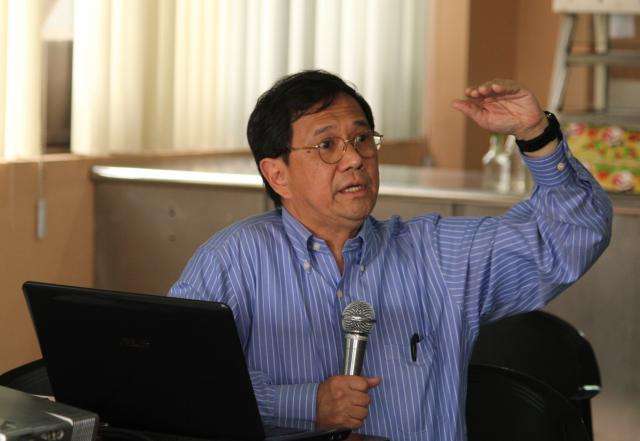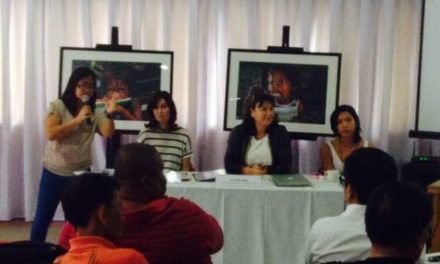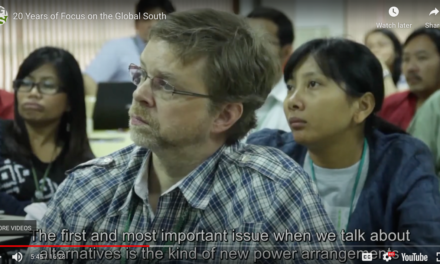Media Release – Focus on the Global South-Philippines
2 August 2011
There is a strong case to make on behalf of industrial policy in developing countries like the Philippines. This is the central message of a roundtable discussion on Industrial Policy held July 31, 2011, with respected Filipino economist Dr. Manuel “Butch” Montes as main speaker.
Philippine government has ditched industrial policy supposedly because of its susceptibility to corruption and rent seeking, but according to Dr. Montes, even governments that have adopted trade liberalization measures are now implementing “non-purposive industrial policy interventions because of private sector pressures and market imperfections.” Put simply, Montes said that rent seeking happens even in the most liberalized economies and governments’ investment decisions are a result of industrial lobbies and the balancing of many interests.
Montes was formerly with the UP School of Economics and is the current Chief of Policy Analysis and Development Branch of the Financing for Development Office of the United Nations Department of Economic and Social Affairs (UNDESA). The RTD was organized by various Philippine advocacy organizations and progressive think tanks to initiate a process of discussion, consensus building and advocacy around a Philippine industrial policy. This is to counterbalance the P-Noy government’s economic policies of private-public partnerships, patterned after previous build-operate-transfer schemes, and of continuing trade liberalization.
“Industrial policy is all about new technology that can be scaled up and where a country can be competitive,” said Dr. Montes. He said that industrial policy can capitalize on technological innovations to promote the development of specific industries with competitive advantage within their boundaries. He debunked old economist thinking that government interventions ward off foreign investors and cited the cases of China and Korea which adopted an industrial policy that focused on promoting green industries and used trade interventions and export orientation to develop their target industries.
One area for industrial policy Montes discussed is green technologies, which is the subject of the 2011 World Economic and Social Survey UNDESA recently launched.
The industrial policy Dr. Montes espouses also banks on broad participation, stressing strong linkages among different sectors. He said that “government would be investing anyway, so why not carefully choose the sectors it would invest in?” Montes further emphasized that good policies in health and education, while they cannot strictly be considered industrial policy, could be relevant ingredients of industrial policy. For instance, government can put more support to science and technology research in the universities, and harness the country’s substantial healthcare workforce towards the adoption of higher technology. Doing this effectively prepares the country for higher industries, he explained.
Atty. Nepomuceno Malaluan of the policy group Action for Economic Reforms (AER) and Co-Convenor of the Development Roundtable Series who also spoke in the RTD, pointed out that the too-aggressive implementation of the Philippine government of its trade liberalization policy has marginalized the weak sectors (e.g. agriculture). Contrary to all predictions that trade liberalization would prop up industry and agriculture, data show that it has weakened these basic sectors, Malaluan said.
He added that the trade policies did not usher in industrialization and development but shifted domestic capital away from industry and agriculture. “Unfortunately, in the 30 years of trade liberalization Philippine-style, the economy has settled into its new structure. Big capital has adjusted. If we look at the country’s 40 richest, they have all diversified away from agriculture and manufacturing into services and non-tradeables, particularly utilities, property, retail trade and infrastructure.”
As an immediate relief, Malaluan proposed a modest across-the-board adjustment of tariff rates comparable to the country’s immediate Asian neighbors. This will recover some protection for domestic production, lift income and employment, and improve the prospects of Philippine agriculture. Beyond this, he said that it is time to talk seriously about industrial policy.
The roundtable discussion was jointly sponsored by Action for Economic Reforms (AER), Focus on the Global South – Philippines Program, EU-ASEAN FTA Campaign Network, Philippine Rural Reconstruction Movement (PRRM) and the Development Roundtable Series (DRTS).
*For inquiries please get in touch with Clarissa V. Militante ([email protected]) or Carmina Obanil ([email protected]) at 433-08-99.









